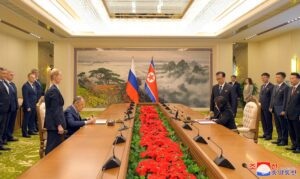South Korea’s Defense Minister Shin Won-sik has warned that North Korea is contemplating a nuclear test around the time of the U.S. Presidential election. This alarming development, encapsulated in the headline South Korea Warns North Korea May Test Nuke During US Election underscores the volatile nature of geopolitics in the Korean Peninsula and raises significant concerns about regional stability and global security.
Why is North Korea planning a nuclear test around the US election?
North Korea aims to increase its leverage against the U.S. by conducting a nuclear test at a politically sensitive time. This tactic is designed to gain international attention and potentially pressure the incoming U.S. administration into concessions.
What does Shin Won-sik’s visit to Japan signify?
Shin’s visit to Japan marks the first by a South Korean defense minister in 15 years, highlighting renewed efforts to overcome historical frictions and enhance trilateral defense strategies with Japan and the U.S. This cooperation is deemed essential for regional stability and security.
What is the significance of the North Korea-Russia collaboration?
North Korea’s collaboration with Russia has intensified, with Pyongyang supplying artillery and missiles to Russia for use in the Ukraine invasion. In exchange, Russia is providing technical support to upgrade North Korea’s weaponry. This partnership is reminiscent of Cold War-era mutual defense agreements.
What are the risks of a potential conflict on the Korean Peninsula?
A full-scale war on the Korean Peninsula could result in millions of casualties and immense global economic damage, estimated at $4 trillion in the first year alone, which represents 3.9% of the global GDP. Additionally, heightened sanctions and diplomatic measures might be challenged due to Russia’s intent to veto new sanctions at the United Nations Security Council.
How does North Korea’s collaboration with Russia impact the situation?

Shin noted that North Korea might feel emboldened to conduct nuclear tests due to its increased cooperation with Russia. He highlighted that Russia is likely providing technical support for the modernization of North Korea’s conventional weapons, which could lead to significant advancements in its weapons systems.
How have South Korea, Japan, and the US responded?
he potential for a nuclear test by North Korea adds to the already heightened tensions in the region. North Korea’s leader, Kim Jong Un, has been expanding the country’s nuclear arsenal and has consistently warned against increased cooperation between South Korea, Japan, and the United States. Recently, President Biden and South Korean President Yoon Suk Yeol authorized the signing of joint nuclear deterrence guidelines, prompting Pyongyang to threaten to boost its own nuclear fighting capability.
What are the potential consequences of a North Korean nuclear test?
The possibility of a nuclear test around the U.S. election raises significant concerns about regional stability and global security. A nuclear test could lead to a severe escalation in tensions, resulting in increased military presence and potential conflict in the region. The international community, particularly the allied countries of South Korea, Japan, and the United States, remains vigilant in monitoring North Korea’s actions and potential provocations.
What are the next steps for the international community?
The Hill has reached out to the State Department, Pentagon, and National Security Council for further responses on this critical issue. The international community needs to prepare for potential diplomatic and military responses to mitigate the risks associated with North Korea’s actions.
How does this situation affect global geopolitics?
This development adds a layer of complexity to global geopolitics, especially given the ongoing conflicts and diplomatic tensions involving North Korea, Russia, and the U.S. The potential nuclear test could shift the balance of power and prompt a reevaluation of international strategies to maintain peace and security.
The warning that “North Korea Mulling Nuclear Test Around U.S. Election, South Korea Warns” presents a critical juncture in international relations. This potential nuclear test, strategically timed with the U.S. election, could significantly impact global geopolitics and regional stability. As tensions escalate, the international community must remain vigilant and prepared to address the challenges posed by North Korea’s actions. The situation calls for coordinated diplomatic efforts and strategic planning to mitigate risks and maintain peace in an increasingly complex global landscape.
Related Articles:
















